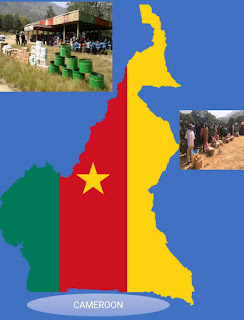Violence in many forms is preventable. There is a strong relationship between levels of violence and modifiable factors such as concentrated poverty, income and gender inequality, the harmful use of alcohol and the absence of safe, stable, and nurturing relationships among people(s).
Risk Factors for the Perpetration of violence include,
history of violent victimization,
attention deficits, hyperactivity or learning disorders,
history of early aggressive behavior,
involvement with drugs, alcohol or tobacco,
low IQ,
poor behavioral control as well as
deficits in social cognitive or information-processing abilities.
A violent crime or crime of violence is a crime in which an offender or perpetrator uses or threatens to use force upon a victim. This entails both crimes in which the violent act is the objective, such as murder, torture or rape as well as crimes in which violence is the means to an end.
Quoting the Cameroon Government's Emergency Humanitarian Assistance document, the following are sited as violence observed during the ongoing Anglophone crisis.
-Violation of the right to education.
-Disruption of economic activities
-Attacks against members of the defence and security forces
-Attacks against administrative and traditional authorities
-Conscription of children into militia groups
-Incitement to violence through social media
-Numerous terrorist abuses against the population.
On the other hand, the population continues to report untold abuses perpetrated by the Cameroon military which to them has caused the death of many citizens and the rising number of internally displaced persons and refugees.
Violence must be discouraged because it constitutes a violation of human rights and includes physical, sexual, psychological, emotional, financial and material abuse, abandonment, neglect and serious loss of dignity and respect.
Nine things we should do to Stop Violence are:
√Settle arguments with words, not fists or weapons. Don't stand around and form an audience.
√Learn safe routes for walking in the neighborhood and know good places to seek help.
√Trust your feelings and if there's a sense of danger, get away fast.
√Report any crimes or suspicious actions to the police and authorities. Be willing to testify if needed.
√If someone tries to abuse you, say no, get away, and tell a trusted adult.
√Don't use alcohol and other drugs and stay away from places and people associated with them.
√Stick with friends who are also against violence and drugs and stay away from known trouble spots.
√Get involved to make your quarter safer and better - having poster contests against violence, holding anti-drug rallies, counseling peers and settling disputes peacefully. If there's no program, help start one!
√Help younger people to avoid being crime victims. Set a good example and volunteer to help with community efforts to stop violence.
Ambe Macmillian A.



No comments:
Post a Comment